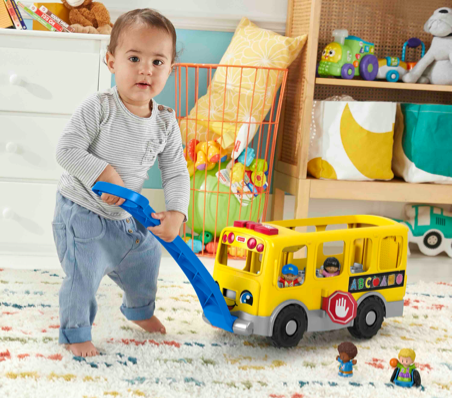Many South African children start Grade R without having developed the necessary physical, cognitive, social-emotional, and language skills required for success in a structured learning environment. According to STATS SA, 30% of children enter school lacking foundational skills, making it difficult for them to complete everyday classroom tasks. Additionally, nearly 40% of Grade R learners struggle with early numeracy and literacy concepts, impacting their future academic success.

Recognising the lack of hands-on, engaging play experiences which create gaps in school readiness, Fisher-Price and the Toy Library Association of South Africa (TLASA) will distribute Little People Big Yellow School Buses to toy libraries in various communities across the country to help kids reach essential developmental milestones. These libraries provide children in underserved communities with access to educational play tools, helping them develop the skills they need for a strong start in school.
“Many children in South Africa lack access to toys that promote early learning and development. By introducing interactive and imaginative play tools to toy libraries, we are giving these children the opportunity to develop essential skills through play,” says Debbie Cockrell, Chairperson of TLASA. “This initiative helps close the learning and development gap, ensuring that more children across the country enter Grade R feeling confident and ready.”
The Department of Basic Education mentions on their website that they recognise the importance of “investing in the early years to ensure that every child can reach their full potential. Quality ECD programmes and services have been shown to improve school readiness, academic achievement and lifelong well-being, particularly for children from disadvantaged backgrounds. “
Studies show that children who engage in structured play-based learning are 25% more likely to develop problem-solving and social skills than those who do not. Children learn best through active and engaging play, where they practice various movements, interactions, and challenges in a fun, low-pressure environment. So, this is how parents help their children develop these critical school-readiness skills before stepping into the classroom:
Physical readiness is essential for daily classroom tasks like holding a pencil, using scissors, and maintaining balance. Fine motor skills, such as gripping crayons or toy characters and buttoning clothes, help children complete precise hand movements, while sensory play with different textures and activities builds coordination and body awareness.
Cognitive readiness prepares children for problem-solving, logical thinking, and early numeracy and literacy. Recognising colours, shapes, and patterns helps with structured learning, while counting and sequencing strengthen early math skills. Engaging in memory-based activities, imaginative play, and storytelling further enhance cognitive endurance and curiosity. Items like the Little People Big Yellow School Bus from Fisher-Price offers a play experience that helps children understand various social and practical concepts through play.
Social-emotional readiness is equally important, as children must learn to interact with teachers and peers. Roleplaying different scenarios helps build confidence, cooperation, and emotional intelligence. Exposure to diverse experiences, like being on a school bus, or engaging with friends, fosters empathy and inclusivity, while encouraging independence boosts self-reliance in a school setting.
Language development plays a critical role in school readiness, as communication skills allow children to express their thoughts and engage in learning. Expanding vocabulary through conversation and storytelling, improving listening skills with songs and rhymes, and practicing discussions during play all contribute to stronger verbal abilities, which is developed through peer interaction that happens during play.
With so much emphasis on school readiness, parents need engaging ways to develop these essential skills—and that’s where play comes in. The Fisher-Price Little People Big Yellow School Bus is designed to help children learn through play, making it a fun and interactive tool for preparing little ones for Grade R.
“The level of innovation in the design of the product speaks to the changing world we live in where children can have access to play resources with characters that resemble themselves, developing inclusive play spaces, exposure to different types of people and fostering conversations with young minds to engage topics in a fun play filled way,” adds Debbie Cockrell.
Considering the characters are all from different cultural identities, and the inclusion of a disability with a character in a wheelchair, the bus also boasts Smart Stages learning content which introduces children to colours, numbers, and sequencing, fostering cognitive development. The interactive features, like pressing buttons, opening doors, and manoeuvring figures, enhance fine motor skills. Roleplaying school scenarios helps children develop social and emotional growth, while engaging with characters during play strengthens language and communication abilities.
Sources
· Statistics South Africa (STATS SA). (2023). “Early Childhood Development and School Readiness Report.”
· Department of Basic Education (DBE). (2023). “Annual Report on Early Learning and Grade R Performance.”
· UNICEF South Africa. (2022). “The Role of Play in Early Childhood Development.”
· Toy Library Association of South Africa (TLASA). (2023). “Impact of Toy Libraries on School Readiness.”



























